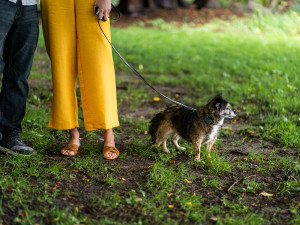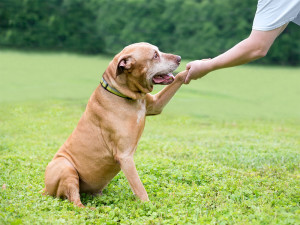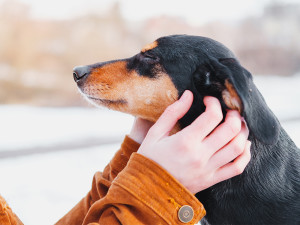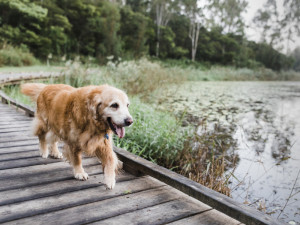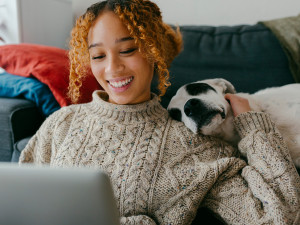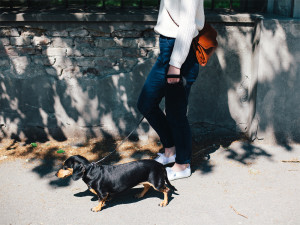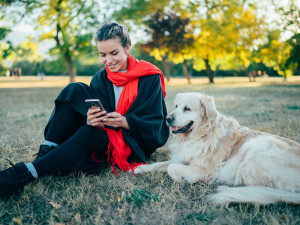Can You Potty Train an Older Dog?
Old dogs, new tricks? Pfft. Just a saying.

Share Article
In This Article:
Can You Train An Older Dog Potty Training?opens in a new tab Challenges of Potty Training Older Dogsopens in a new tab Adult Dog Potty Training Stepsopens in a new tab How Long Does It Take to Potty Train an Older Dog?opens in a new tab Older Dog Training Tipsopens in a new tab Frequently Asked Questionsopens in a new tab
If you’ve adopted a senior dog (or a dog who isn’t a puppy), congrats — you’re doing a great thing. So many senior dogs get overlookedopens in a new tab at shelters just because they aren’t cuddly little pups anymore. But any dog parent to a senior pup will tell you: Older dogs are awesome.
But your dog is unique and has a unique past to match. They come to you with their own set of challenges, triggers, and needs. So, it’s not out of the ordinary that your older pup may come to you needing potty training. Here’s what you need to know.

littleKin™ is Kinship’s home just for puppy and kitten parents. Bop over to check out expert advice, new pet tools, and special deals—all curated for your newest family member.
opens in a new tabCan you train an older dog potty training?
Yes. You can potty train an older dog using similar techniques to how you would potty train a puppy.
This is one of my favorite topics. I have first-hand experience of this with my own dog. I adopted an Australian Cattle Dog, a failed farm dog named Boss. Boss spent his first six years of life going to the bathroom wherever he pleased. Not knowing the warmth of a house or a cozy bed, he slept in the stable each night. It took time, patience, and a lot of paper towels, but we did it and so can you.
Challenges of potty training older dogs
Cognitive abilities
Depending on the age of your dog, they may have certain cognitive difficulties which could potentially make potty training difficult. Very old dogs may suffer from doggy dementiaopens in a new tab, which may limit their ability to learn to be potty trained. If you are adopting a dog from a rescue, they may be able to inform you of this before adoption. It is always a good idea to bring your new dog to the vet as soon as possible to have a full physical to help you determine any possible complications on top of the information you received from the rescue.
Habits
Older dogs are set in their ways and have developed certain habits, which may not fit your lifestyle that will have to be changed or broken to fit in. Depending on where your adult dog is coming from, they may have never experienced living in a home, or a comfy bed, being on a leash, or using the bathroom at designated times. These are all things you will need to introduce your dog to. Habits can be hard to break, but in most cases this can happen with positive reinforcementopens in a new tab, consistency, and patience.
Health issues
Health issues can be a reason a dog has accidents. If you bring home a new dog, it is important to bring them to the vet within two weeks of having them home to get a full physical done. This will help you understand any possible health issues and how to help them or if you need to make the difficult decision to return them. If you notice your dog having accidents that are out of the blue, it is best to take them to the vet to see if they have an illness.
Adult dog potty training steps
Visit the vet.
When bringing home a new dog, you will want to have a vet picked out prior to bringing them home. It is a good idea to get your new dog seen by your vet within two weeks. This way, your vet has a baseline of the health status for your dog and can rule out any possible illnesses.
Find an area they can be alone in your house.
You will want to secure an area in your home where your dog can be when you are not home or able to give them your full attention. I recommend an X-pen opens in a new tab or crate as a great place for thisopens in a new tab. Accidents may happen while you are not around, but this will help limit any mess to one confined area. Most dogs will not go poop or pee in a small area that is made for sleeping.
Begin by building a positive association with the area. Feed your dog their meals, treats, and bones here. After a walk or when you know they are tired put them in the crate or X-pen while you hang out close by. The more comfortable you make this area for them, the better. Be sure to place your dog in here any time you go out or can not watch them even for just a few minutes.
Pick a potty spot.
Next, pick a designated potty area, and make sure you inform anyone who will be walking your dog for pee breaks. Stand in one place and only allow them to walk to the end of the six-foot leash and do a circle around you. Having a tree in the area may help your dog use the bathroom quicker, especially an older dog who likes to mark things. Allowing your dog to sniff everything and pull you when trying to get them to go to the bathroom will create a dog who wants to find the perfect spot to go to the bathroom which can take time. Designating an area teaches your dog to go out to the bathroom right away to get their business done.
Keep a good schedule.
Now, it is time to figure out a schedule that works for you and your dog. Always remember that when potty training an adult dog, you want to take them out shortly after eating, playing, or sleeping. If your dog has frequent accidents, start by taking them out every 45 minutes. Continue to increase the time between potty breaks as you get to know your dog and observe what they do before they need to go.
Be sure to reward your dog heavily as soon as they finish their business. Use a treat that is easy for them to chew. You don’t want to use something that is crunchy and takes a long time for them to munch on. It can be helpful to use something extra special that your dog only gets on potty breaks (a piece of a low-sodium turkey dog, freeze-dried raw kibble, liver). This helps them associate the yummy treat with going pee or poop and hopefully helps speed up the process. Be sure to reward your dog as soon as they finish.
How long does it take to potty train an older dog?
There is no magic timeline for potty training a dog, especially an older dog. Your dog’s past will also play a role in the timeline, as well as the level of consistency you are willing to give.
Give your dog four to six months to learn the ropes and get an understanding of using the bathroom outside. It may take up to a year to fully potty train your dog.
Older dog training tips
If you have a home with more than one exit: Always go out one door for potty breaks. Your dog may begin to stand by the door when they need to go out.
Never scold your dog for accidents: Yelling at your dog for accidents only makes your dog fearful of you. They will become afraid to go in front of you which will cause a decline in your overall potty training. If they do pee in the house, they may hide behind a couch to do it instead. Or they may become hesitant to use the bathroom in front of you outside with the fear of being yelled at.
The special potty area is key to success: If you want to walk your dog have them pee in the designated area and then use a walk as a natural reward for using the bathroom.
Crate dog when alone: Crating a dog is best when bringing a new dog home it can prevent so many issues and alleviate stress. This will teach your dog to hold their potty needs because most will not go when confined in a small area where they sleep. Be sure to take your dog out to pee right away when you get home. Do not allow them free time until you have taken them out.
Ammonia-free cleaner: Be sure to use an ammonia-free cleaneropens in a new tab when cleaning up any accidents. Urine has ammonia in it. If you use a cleaner with ammonia your dog will smell the ammonia and be more likely to mark over that spot again and again.
FAQs
How do I take care of my senior dog?
There are some differences when taking care of a senior dog rather than a younger dog. But remember: Older dogs have just as much love to give as younger dogs. They may even be easier than younger dogs because they aren’t as energetic as puppies.
There are just a few extra things to keep in mind: A senior dog may sleep more than a younger dog. Allow them to have a comfy bed on the flooropens in a new tab, in case jumping on the couch is difficult for them. Senior dogs may take shorter walks than younger dogs, they may tire out sooner or need shorter walks to help protect their joints from hurting. It is a good idea to put your dog on some joint-support treatsopens in a new tab to help keep them mobile and help with arthritis.
Why is my adult dog peeing in the house?
When a dog is having accidents in the house it is always important to rule out any health issues by taking your dog to the vet. They will be able to help you understand if the accidents are a medical issue or a potty training issue. If your new dog is peeing in the house it may just be because they are not potty trained. If that is the case, you will want to begin a potty training protocol to help train your dog to go outside.
References
Kelly, Michelle H. “How to Teach an Old Dog New Tricks: Training Techniques for the Adult Learner.” OnePetro, 11 June 2006, onepetro.org/ASSPPDCE/proceedings-abstract/ASSE06/All-ASSE06/32840opens in a new tab. Accessed 30 Dec. 2024.
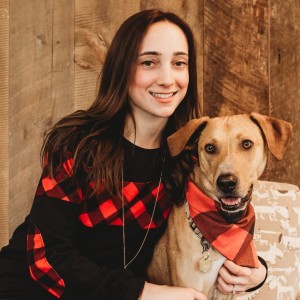
Danielle Vrabel, CPDT-KA
Danielle Vrabel is a dog trainer who earned her CPDT-KA in 2020. Danielle is a proud pet mom of five pets: two dogs, two cats, and a corn snake. Danielle has fostered over 10 dogs and 15 cats/kittens as well as helped train shelter dogs before they are adopted. Both of Danielle’s dogs are pet therapy dogs, where she also volunteers her time helping evaluate future therapy dogs.
Related articles
![Old dog being pet by person]() opens in a new tab
opens in a new tabWhy You Should Adopt a Senior Dog This Month
November is Adopt a Senior Pet Month. Here are all the reasons you should welcome a senior pup into your family.
![]() opens in a new tab
opens in a new tab13 Products Your Senior Dog Needs
From doggie diapers to toe grips, this gear will help your pet thrive through their golden years.
![A woman staring at her computer while holding her dog close.]() opens in a new tab
opens in a new tab10 Things to Consider Before Adopting a Pet
It’s a big decision, so check these boxes before you sign on the dotted line.
![Woman walking her small black dog outside on leash.]()
Do Small Dogs Pee More Often?
Research shows that little dogs may feel the need to scent mark more frequently than big dogs.
- opens in a new tab
How Long Can You Leave a Dog Alone?
Not that you want to be away from them anyway.
![Young woman with her senior dog in the autumn park.]() opens in a new tab
opens in a new tabEverything You Need to Know to Care For Your Senior Dog
Your older dog is the love of your life. Here are some health issues to look out for.
